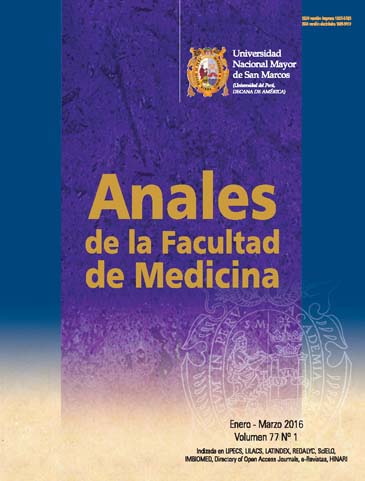Adalimumab, therapeutic alternative in the Vogt Koyanagi Harada syndrome refractory to infliximab: case report
DOI:
https://doi.org/10.15381/anales.v77i1.11554Keywords:
Uveomeningoencephalitic syndrome, Vogt Koyanagi Harada, Adalimumab, Infliximab.Abstract
Vogt Koyanagi Harada syndrome (VKH) is a bilateral panuveitis included in the uveomeningeal syndromes. Treatment of its chronic stage is difficult because of poor response to mmunomodulation. Other therapeutic options include biological agents such as anti-TNF alpha. We present the case of a patient with severe VKH resistant to infliximab that responded to adalimumab. Adalimumab is a humanized monoclonal antibody effective when there is resistance to infliximab in patients with chronic persistent VKH syndrome. The case presented is interesting because of uncommon resistance to this drug in the clinical practice; the use of tissue plasminogen activator contributed significantly to visual improvement.Downloads
Published
2016-03-14
Issue
Section
Casos clínicos
License
Copyright (c) 2016 Eugenio Franklin Moya Ayre, Iván Bermúdez Maldonado

This work is licensed under a Creative Commons Attribution-NonCommercial-ShareAlike 4.0 International License.
Those authors who have publications with this magazine accept the following terms:
- Authors will retain their copyrights and guarantee the journal the right of first publication of their work, which will be simultaneously subject to Creative Commons Attribution License that allows third parties to share the work as long as its author and its first publication this magazine are indicated.
- Authors may adopt other non-exclusive licensing agreements for the distribution of the version of the published work (eg, deposit it in an institutional electronic file or publish it in a monographic volume) provided that the initial publication in this magazine is indicated.
- Authors are allowed and recommended to disseminate their work over the Internet (eg: in institutional telematic archives or on their website) before and during the submission process, which It can produce interesting exchanges and increase quotes from the published work. (See El efecto del acceso abierto ).
How to Cite
1.
Moya Ayre EF, Bermúdez Maldonado I. Adalimumab, therapeutic alternative in the Vogt Koyanagi Harada syndrome refractory to infliximab: case report. An Fac med [Internet]. 2016 Mar. 14 [cited 2025 Jun. 7];77(1):55-8. Available from: https://revistasinvestigacion.unmsm.edu.pe/index.php/anales/article/view/11554



